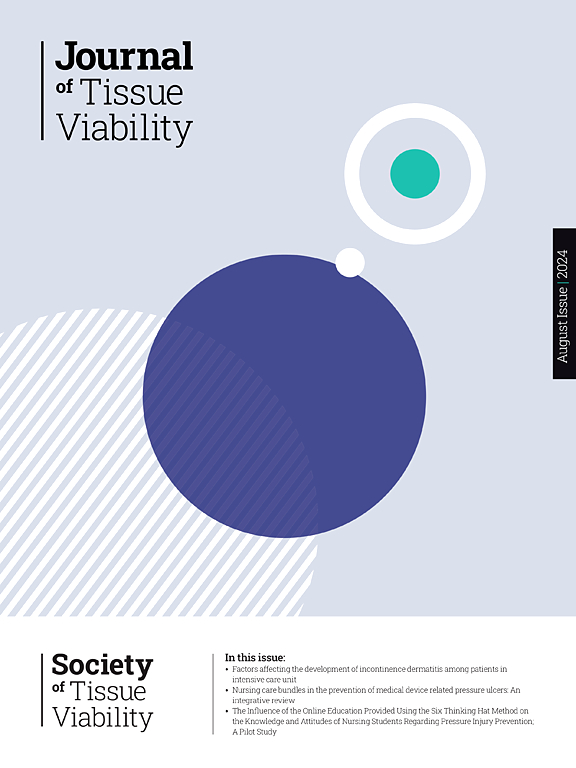A discharge planning program to prevent infection among patients with diabetic foot ulcers in Taiwan: A randomized controlled trial study
IF 2.4
3区 医学
Q2 DERMATOLOGY
引用次数: 0
Abstract
Trial and protocol registration
This study is registered with ClinicalTrials.gov, No. NCT04467606.
Background
Patients hospitalized for foot ulcers have a high readmission rate due to wound infections, and treating these infections is costly.
Aims
This study aimed to investigate the effect of a discharge planning program that uses a motivational interviewing strategy (MI) on infection prevention in patients with diabetes-related foot ulcers (DFUs).
Methods
A randomized controlled trial was conducted at a hospital in Taiwan from August 2020 to October 2022. A total of 132 hospitalized adult patients with DFUs were recruited and randomized into either MI or control group in a 1:1 ratio by block randomization, with 66 patients in each group. In the MI group, the interview was conducted at least one day before discharge, within three days after discharge, and then weekly for the first month and every one to three months thereafter. The control group received the usual care. The Diabetes Foot Self-Care Behavior Scale (DFSBS) and Diabetes-related Foot Ulcer Self-Management Behavior Scale (DFUSMB) were used to collect foot self-care and DFU self-management behaviors. Infectious status was determined according to the IWGDF/IDSA classification. Cox regression and generalized estimating equation (GEE) were used for data analysis.
Results
After adjusting for significant variables, the univariate Cox regression analysis results showed no statistically significant difference in foot infection or readmission rates between the two groups. In the GEE analysis, after adjusting for covariates, the results showed that the foot self-care behaviors of patients in the intervention group after discharge were better than those in the control group, reaching statistical significance. However, behaviors specific to DFU self-management were not statistically significant.
Conclusions
Although motivational interviewing has shown to be effective in promoting foot self-care behaviors, more research is needed on how to reduce post-discharge foot infections and hospitalizations.
台湾糖尿病足溃疡患者预防感染的出院计划:一项随机对照试验研究
试验和方案注册本研究已在ClinicalTrials.gov注册,注册号:NCT04467606。背景:因足部溃疡住院的患者由于伤口感染有很高的再入院率,并且治疗这些感染的费用很高。目的:本研究旨在探讨采用动机性访谈策略(MI)的出院计划方案对糖尿病相关性足溃疡(DFUs)患者感染预防的影响。方法于2020年8月至2022年10月在台湾某医院进行随机对照试验。共招募了132名住院的成年DFUs患者,采用块随机法按1:1的比例随机分为MI组或对照组,每组66名患者。MI组至少在出院前1天、出院后3天内进行访谈,第一个月每周访谈一次,之后每1 - 3个月访谈一次。对照组接受常规护理。采用糖尿病足部自我保健行为量表(DFSBS)和糖尿病相关足溃疡自我管理行为量表(DFUSMB)收集足部自我保健和DFU自我管理行为。根据IWGDF/IDSA分类确定感染状态。采用Cox回归和广义估计方程(GEE)进行数据分析。结果对显著变量进行校正后,单因素Cox回归分析结果显示,两组患者足部感染和再入院率无统计学差异。在GEE分析中,对协变量进行调整后,结果显示干预组患者出院后足部自我护理行为优于对照组,具有统计学意义。然而,DFU自我管理的特定行为没有统计学意义。结论动机性访谈对促进足部自我护理行为有效,但如何减少出院后足部感染和住院率仍需进一步研究。
本文章由计算机程序翻译,如有差异,请以英文原文为准。
求助全文
约1分钟内获得全文
求助全文
来源期刊

Journal of tissue viability
DERMATOLOGY-NURSING
CiteScore
3.80
自引率
16.00%
发文量
110
审稿时长
>12 weeks
期刊介绍:
The Journal of Tissue Viability is the official publication of the Tissue Viability Society and is a quarterly journal concerned with all aspects of the occurrence and treatment of wounds, ulcers and pressure sores including patient care, pain, nutrition, wound healing, research, prevention, mobility, social problems and management.
The Journal particularly encourages papers covering skin and skin wounds but will consider articles that discuss injury in any tissue. Articles that stress the multi-professional nature of tissue viability are especially welcome. We seek to encourage new authors as well as well-established contributors to the field - one aim of the journal is to enable all participants in tissue viability to share information with colleagues.
 求助内容:
求助内容: 应助结果提醒方式:
应助结果提醒方式:


